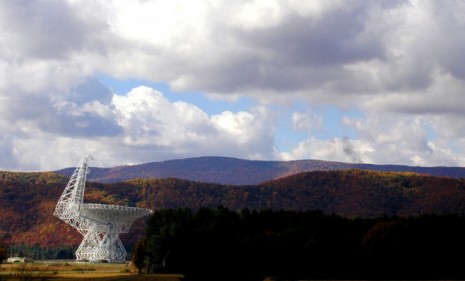West Virginia's colony for 'Wi-Fi refugees'
An unusual condition purportedly caused by wireless signals has sufferers fleeing to an isolated Appalachian town

A free daily email with the biggest news stories of the day – and the best features from TheWeek.com
You are now subscribed
Your newsletter sign-up was successful
You may find cell phones annoying, but for some people, they're downright sickening. These people suffer from an unusual — and disputed — condition known as electromagnetic hypersensitivity, or EHS. And in our wireless age, their lives can be hell. But many EHS victims have found a place that's almost heaven: West Virginia. In an area of the state where wireless technology and radio signals are forbidden, these "Wi-Fi refugees" have found shelter. Here, a brief guide:
What exactly is this condition?
Symptoms may include fatigue, dizziness, nausea, heart palpitations, and digestive disturbances, according to the World Health Organization. An estimated 5 percent of Americans believe they have the condition, though Sweden is currently the only country that recognizes EHS as a real syndrome. Some studies have found that EHS could be caused by electromagnetic fields found in the environment, though many medical experts are skeptical.
The Week
Escape your echo chamber. Get the facts behind the news, plus analysis from multiple perspectives.

Sign up for The Week's Free Newsletters
From our morning news briefing to a weekly Good News Newsletter, get the best of The Week delivered directly to your inbox.
From our morning news briefing to a weekly Good News Newsletter, get the best of The Week delivered directly to your inbox.
And these EHS sufferers are fleeing to West Virginia?
Yes, largely because an isolated area in the state is home to the National Radio Astronomy Observatory, which is in Green Bank, and to radio receiving facilities belonging to Navy intelligence and, purportedly, the National Security Agency. The entire 13,000-square-mile region is therefore off-limits to radio signals, cell phone towers, and other signals that would disrupt those government installations.
What is it like to live there?
Quiet. The village of Green Bank — population 143 — has become a mecca for people who believe their lives have been disrupted by EHS. Until she moved to Green Bank, Diane Schou lived in a shielded metal cage to try and alleviate her EHS symptoms. "Living here allows me to be more of a normal person," says Schou, as quoted by BBC News. "I can be outdoors. I don't have to stay hidden."
A free daily email with the biggest news stories of the day – and the best features from TheWeek.com
-
 The mystery of flight MH370
The mystery of flight MH370The Explainer In 2014, the passenger plane vanished without trace. Twelve years on, a new operation is under way to find the wreckage of the doomed airliner
-
 5 royally funny cartoons about the former prince Andrew’s arrest
5 royally funny cartoons about the former prince Andrew’s arrestCartoons Artists take on falling from grace, kingly manners, and more
-
 The identical twins derailing a French murder trial
The identical twins derailing a French murder trialUnder The Radar Police are unable to tell which suspect’s DNA is on the weapon